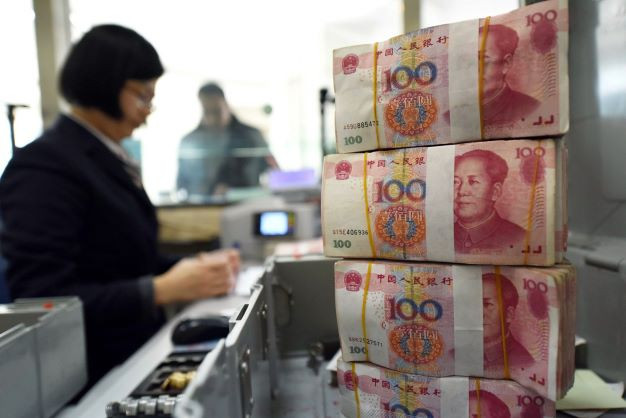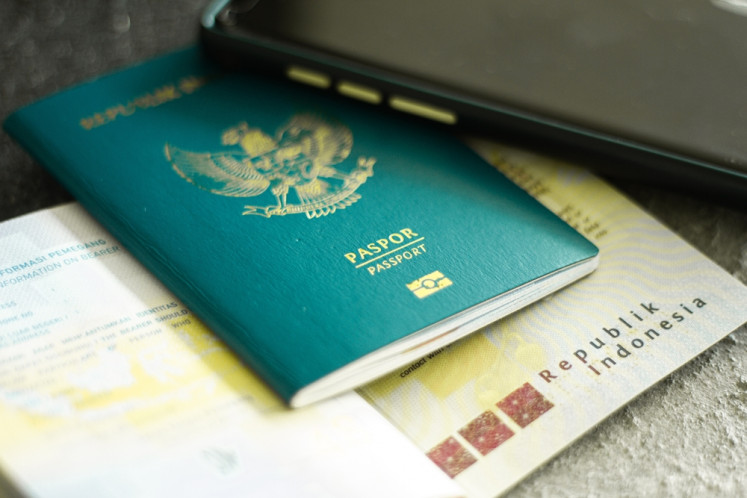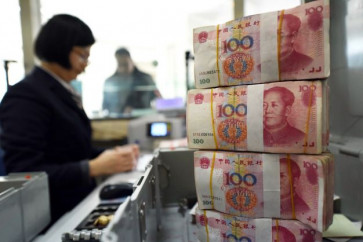Potential benefits of Renminbi Liquidity Arrangement for Indonesia
While the RMBLA marks another milestone for China's effort to internationalize its currency, Indonesia would do well to be aware of the pitfalls and moral hazards that such currency arrangements might carry.
Change Size
 Bound 100 yuan (US$15) banknotes are arranged on Jan. 7, 2016 at a bank in Lianyungang, in the eastern Chinese province of Jiangsu. (AFP/Stringer)
Bound 100 yuan (US$15) banknotes are arranged on Jan. 7, 2016 at a bank in Lianyungang, in the eastern Chinese province of Jiangsu. (AFP/Stringer)
T
he Bank of International Settlements (BIS), the Swiss-based institution which acts as the central banks of central banks, recently announced the launch of the Renminbi Liquidity Arrangement (RMBLA). This scheme will provide liquidity for participating central banks in times of market stress through funds of RMB 90 billion (US$13.43 billion) pooled from six Asia-Pacific economies, including China and Indonesia.
This is another small step for China in its effort to internationalize the renminbi. The last major milestone was in 2016, when the renminbi was added to the International Monetary Fund’s exclusive club of Special Drawing Rights (SDR) currencies, along with the US dollar, Japanese yen, euro and the British pound. However, China’s effort has not been smooth, as a botched attempt to introduce market-oriented reforms in 2015 led to massive capital outflows, souring investors on China and prompting Beijing to reintroduce capital controls.
Despite the challenges, internationalizing the renminbi is an important part of China’s bid to achieve the status of a great power. Despite its rising stature, large parts of China’s economy have remained dependent on US dollar financing through Japanese and Western banks. Furthermore, an internationally recognized renminbi will give China more sway in the international financial and economic system and some forms of “exorbitant privilege” that only a few economies – namely the US and the eurozone – have hitherto enjoyed.
The Russia-Ukraine conflict and the subsequent sanctions against Russia have only served to further accelerate its effort. At the recent Brazil, Russia, India, China, South Africa (BRICS) summit, China rallied the bloc’s leaders to establish an alternative reserve currency. Meanwhile, Chinese holdings of US Treasuries have hit a decade low, paralleling Russia’s actions following US sanctions in the aftermath of the Crimea annexation in 2014.
In addition, China has just announced a new “Swap Connect” facility with Hong Kong that will allow mutual access to interest rate swaps. This will facilitate foreign holders of renminbi-denominated bonds to hedge their risk exposures, making them more attractive investment propositions. An open and liquid market for renminbi financial instruments is a prerequisite for its acceptance as a reserve currency.
The RMBLA’s establishment is a highly significant and symbolic milestone for renminbi internationalization. It sends a message that China is claiming Asia and the Pacific as its own backyard, in which it will promote the use of its own currency.
It can also be seen as a challenge to the Chiang Mai Initiative Multilateralism (CMIM), which provides a reserve pool of US dollar liquidity, thereby implicitly accepting US supremacy in the global financial architecture. It also depends on IMF conditionality for borrowing more than 30 percent of a country’s quota, which makes it unpalatable to use except in the event of extreme crises.


















